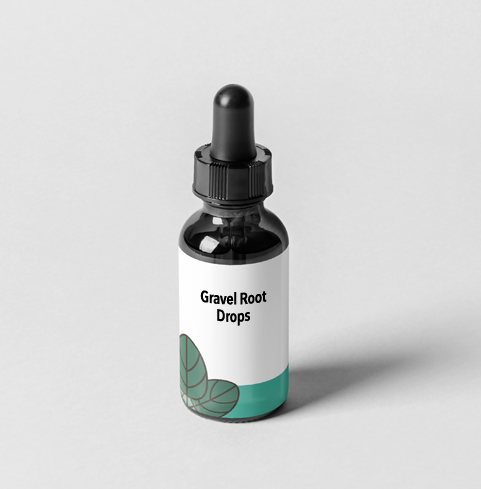Gravel Root Herbal Drops
Description
Common Name: Gravel Root
Botanical Name: Eupatorium purpureum
Part Used: Root
Ratio: 1:1
Gravel Root: May be helpful with Kidney stones, gallstones.
The origin of the name “gravel root” is appropriately attributed to its popularity as an herb believed to break down kidney stones (gravel). The most potent part of the herb are its leaves, roots, and rhizomes (root-like stems) and contain high concentrations of oleoresin euparin, tannins, flavonoids, and sesquiterpene.
Gravel root was traditionally considered an important tool for softening, dissolving, and promoting the passage of kidney stones. Gallstones form when an excess substances accumulate in the bile, resulting in hard, crystalline stones.
Gravel root has been cited by some cultures as being able to dissolve existing gallstones and discouraging new stones from forming.
Gravel root was sometimes used against edema due to natural diuretic properties. Natural diuretics may help flush excess water. Gravel root has also been used in the alleviation of painful bouts of urination (dysuria), possibly due to its soothing, astringent properties on the mucus membranes of the urinary tract.
Precautions
Not for use during pregnancy or lactation.
If you have a medical condition or take pharmaceutical drugs please consult your doctor prior to use.
1ml = 1000mg of dry herb
Adult Dose: 2ml once to three times daily.
We will automatically send a 'Duty of Care' form for you to fill out.
So that we can ensure no herb/medication interactions.
Please feel free to contact our naturopath if you have any questions at herbsonline5@gmail.com
Price range: $35.50 through $108.00 excl. GST
PRODUCT INFORMATION
Common Name: Gravel Root
Botanical Name: Eupatorium purpureum
Part Used: Root
Ratio: 1:1
Gravel Root: May be helpful with Kidney stones, gallstones.
The origin of the name “gravel root” is appropriately attributed to its popularity as an herb believed to break down kidney stones (gravel). The most potent part of the herb are its leaves, roots, and rhizomes (root-like stems) and contain high concentrations of oleoresin euparin, tannins, flavonoids, and sesquiterpene.
Gravel root was traditionally considered an important tool for softening, dissolving, and promoting the passage of kidney stones. Gallstones form when an excess substances accumulate in the bile, resulting in hard, crystalline stones.
Gravel root has been cited by some cultures as being able to dissolve existing gallstones and discouraging new stones from forming.
Gravel root was sometimes used against edema due to natural diuretic properties. Natural diuretics may help flush excess water. Gravel root has also been used in the alleviation of painful bouts of urination (dysuria), possibly due to its soothing, astringent properties on the mucus membranes of the urinary tract.
Precautions
Not for use during pregnancy or lactation.
If you have a medical condition or take pharmaceutical drugs please consult your doctor prior to use.
1ml = 1000mg of dry herb
Adult Dose: 2ml once to three times daily.
We will automatically send a 'Duty of Care' form for you to fill out.
So that we can ensure no herb/medication interactions.
Please feel free to contact our naturopath if you have any questions at herbsonline5@gmail.com


